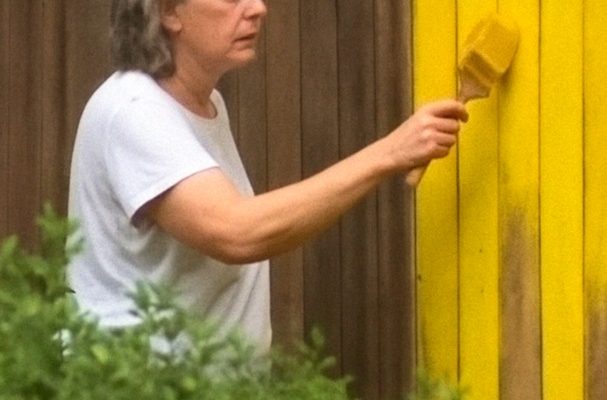Share this:
I moved to a run-down farm I’d just inherited, hoping for peace and maybe even a fresh start. But when my neighbor started copying everything I did—down to the smallest details—I had no idea it was only the beginning of something much deeper, much more personal.
I grew up in a foster family. They were kind and patient, always making sure I had what I needed—lunches packed for school, claps at my school plays, even when I was standing at the back in a silly cardboard tree costume.
But I learned early on that real love is more than just warm meals or polite applause. Real love is about knowing where you come from. The story of you.
No one ever told me anything about my biological parents. The papers said they wanted complete confidentiality—no names, no birthdays, no history. Just empty spaces where big, important things should have been.
As I got older, I dreamed up wild stories. Maybe they were spies. Or rock stars. Maybe they were lost in the jungle, far away from everything. Anything seemed better than the thought that they just didn’t care enough to be part of my life.
I had to grow up fast. By the time I was 15, I was handing out flyers at strip malls. By 16, I was walking dogs for people who barely remembered my name. At 18, I worked at a coffee shop where the regulars tipped in nickels and offered unsolicited life advice.
“You should marry rich, sweetheart. You’ve got kind eyes.”
By 19, I was an official barista with a crooked name tag and had memorized all the drink orders. Then came more jobs—caregiver, mail carrier, gardener, and for a while, I even collected roadkill off the highway.
Don’t ask.
I knew how to survive. But I felt like bad luck was just a part of who I was.
By the time I was 27, I thought I’d finally found stability. I landed my dream office job, a steady paycheck, weekends off. It felt like I’d finally won at life.
Then, the sickness came.
Six months of tests. Doctors shrugging.
“Could be stress,” they said.
Yeah, no kidding.
At 30, I became a nanny, but things went south fast. Another nanny accused me of stealing from the family, and I got fired. I stood outside the house, holding a suitcase, my emergency fund stuffed in my jacket pocket, staring blankly.
Then my phone rang.
“Ellie? It’s Jake, your father’s attorney,” a warm voice said.
“My who?”
“Your father, Henry. He passed away recently. You’ve been named the sole heir to his farm. It’s about 30 kilometers out of town. You can pick up the keys tomorrow.”
“A farm?” I repeated, still in disbelief. “A father?”
“Biological,” he said gently. “I’ll explain more in person.”
I didn’t sleep at all that night. I had a father. And he left me a home. For the first time in my life, something was actually mine.
When I arrived at the farm, I sat in the car for a minute, staring at the house, the fields, and the complete silence that surrounded it. One question buzzed in my mind, louder than anything else:
Why did he leave all of this to me?
The house looked worn-down, the paint chipped and peeling, weeds taking over the yard. But then I saw the barn. It was clean, freshly painted red with doors that were solid and strong. It looked… proud.
Curious, I walked inside. The smell of hay hit me immediately. The floor was swept clean. Neat stacks of hay were lined against the walls. A basket of fresh eggs sat nearby, like someone had just collected them. A bucket of water sat in the corner, clear enough to drink.
And then I saw the animals. Chickens pecked around, clucking softly. A big brown-and-white cow stood calmly, blinking at me.
But the strangest thing? The dog. He was sitting by the door, staring at me like he’d been waiting for me to arrive. His fur was a little shaggy, but when I crouched down and called him over, he trotted to me and licked my hand like we were old friends.
“Okay, weird,” I muttered, looking around. “Who’s been feeding you?”
It had been a week since my father passed.
So, who had been taking care of all this? Must’ve been the neighbors.
I dropped my bag by the door and wandered through the house. Dust floated in the sunlight like lazy snowflakes. On the wall, there was just one photo of a man in his 50s. His eyes were warm, kind, and when I looked at it, my chest tightened with something I couldn’t explain.
I sat on the floor and just looked around. I didn’t know this man. I didn’t know this farm. But for some reason, I wasn’t scared. I stayed.
Each morning, I woke up with a new purpose. I fixed the broken fence, painted the porch, and even figured out how to collect eggs without getting pecked.
I wasn’t sure how I knew all this stuff, but I just did. It was like something inside me clicked—a secret switch that turned on.
“Farmer Mode: ON,” I joked to myself.
Just as I was starting to feel like I belonged, Linda, my neighbor, showed up.
At first, I thought she was shy. Then, I thought she was just a little… odd.
And then, she started copying everything I did. That’s when things got really strange.
“What the…?”
I froze in front of the kitchen window, a spoonful of cereal halfway to my mouth.
Yesterday, I had painted my fence a bright yellow. It was the only paint I had left in the shed, and I was on a tight budget. The smell was awful, but the fence looked cheerful.
Now, I looked across the property line. Linda’s fence was also yellow. The exact same shade.
“Maybe it’s a coincidence,” I thought, trying to brush it off.
The next day, I built a new mailbox. I was so proud of it—wooden with a tiny sloped roof and a carved bird sitting on top. It took me all afternoon and three Band-Aids.
“Nice job, Ellie,” I said to myself, stepping back.
But the next morning, I stepped outside, and there it was. Linda’s mailbox. Same shape. Same roof. Same bird.
“You’ve got to be kidding me,” I muttered, gripping my coffee cup.
And it didn’t stop there.
I planted daisies in a neat row by my front steps—my favorite flower. The next morning, Linda’s yard had the same row of daisies, with the same little stones around them.
I walked outside and just stared across the fence at her yard.
Is she watching me? Copying me on purpose?
I tried to ignore it, but then came yoga.
One sunny morning, I unrolled my mat on the grass and began my usual stretches. When I glanced over, Linda was in the exact same pose.
She was wearing jeans and a floppy hat, wobbling like she was trying too hard.
That was it. I’d had enough. I marched across the yard, marched right to her gate, and knocked.
“Hey, Linda! We need to talk!”
The door creaked open slowly. She stood there, still, her eyes wide, serious, and maybe a little scared.
“Why are you copying everything I do? What do you want from me?” I demanded.
She didn’t answer. She just stepped back and nodded slightly.
I followed her inside.
That’s when I saw them—letters. Dozens of them, scattered across the table, all addressed to me.
“What are these?” I asked, picking up the top one.
Her fingers trembled as she handed me the letter. I opened it.
“My dear Ellie,
I don’t know how to talk to you. I don’t know if you’d even want to listen.
But I am your mother. I lived near your father. We were never officially divorced, but we lived apart. When you were born, I was… different.
I have autism. Life overwhelmed me, and your father thought it would be best for a stable family to raise you. But I’ve always known about you. And when he passed, I took care of the farm. And then you came…
I didn’t know how to approach you or how to speak to you. So, I started copying you. It was my way of trying to be close.”
I stared at the letter. Then, I looked up at her.
She stood perfectly still, barely breathing.
I grabbed another letter. It was older. And when I opened it, a photo fell out. Young Linda was holding a toddler, both of them smiling.
“Is this…?” I asked, my voice cracking.
“That’s my daughter. Ellie.”
“Me?”
“My daughter,” she whispered, a tear slipping down her cheek.
And just like that, something inside me broke. Without even thinking, I turned and ran. I ran back to my yard, past the daisies, past the mailbox.
And I cried.
I didn’t know how to fix anything. I didn’t know if I was ready to face it.
Days passed. I stayed inside, no reading, no coffee, no gardening. I just lay on the couch, watching shadows crawl across the ceiling, wishing they would somehow make sense of everything.
I wasn’t sick—not in any way doctors could fix. It was the kind of ache that filled your chest, making everything feel heavy and weightless at the same time.
I thought knowing the truth would bring me peace.
But instead, I found a mother. And somehow, that unraveled me more than all the years I spent wondering.
Then one morning, I opened the door to find a stack of thick letters, all tied with string.
I took them inside, my hands shaking. Each envelope was labeled with a year. One letter for each of my 30 years.
I read them all. Each one. Each was handwritten in careful script, some with drawings, some with dried petals. Every letter was filled with emotions—wonder, sorrow, and love.
So much love.
Linda had written to me every year. For birthdays I never told her about. For first days of school. For college I never even finished. She had imagined it all, sending her wishes to the void.
And I cried. For the first time, I didn’t feel forgotten.
The next morning, I opened the door to find my flowerbeds watered, the animals fed, and the yard freshly swept. A folded note was tucked under a jar of jam on the porch.
“Saved the milk in my fridge.
Love, Mom.”
Mom.
I stared at the word, feeling the weight of it in my hands.
For the first time, it didn’t feel like a dream. I had a mother. A quiet, complicated, awkward woman who showed love not with words, but through letters and small gestures.
And suddenly, I understood. Maybe it wasn’t her who failed me. Maybe it was life. The way it had torn everything apart before we could piece it together.
Dad’s guilt lived in the land, in the walls, in the silence he left behind. But I had the power to change it. To rewrite the ending.
I made a decision then. Stepping out into the morning sunlight, barefoot, like I always did.
Linda was in her yard, wobbling through a yoga pose, her sunhat about to fall off.
“That’s… the warrior pose. Not my favorite either,” I said, stepping closer.
She froze and looked at me. A small, shy smile tugged at her lips.
“You’re doing great,” I added. “But you’ll do better without the hat.”
She took it off, smoothing the brim with her fingers, and laid it gently on the grass. Then, she moved into the tree pose. She wobbled and fell over sideways.
I laughed. Really laughed—for the first time in days.
“Okay,” I said, walking closer to the fence. “Let’s make a deal. I’ll show you one pose, and you try it. But no more copying my mailbox.”
She nodded quietly.
“You’ll do better if you relax your fingers,” I said.
And we stood there, side by side, under the same sky. A little clumsy, a little unsure, but not alone anymore.
Later, we shared tea at my house. I pointed to the photo in one of her letters.
“Is that… you?” I asked.
She nodded, her eyes soft.
“And my daughter Ellie. It’s you and me.”
I smiled. “I’ve read all the letters. Thank you, Mom.”
She clutched her teacup with both hands.
“Can I try that one pose tomorrow? The one where the leg goes up?”
I smiled back. “Of course.”
And we laughed again. It felt like life was finally finding its color.
And you know what?
That yellow fence didn’t seem so strange anymore. Maybe it was just the beginning. Just like us.



